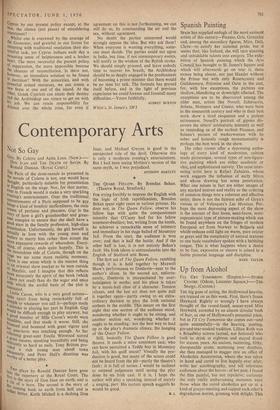Contemporary Arts
Not So Gay
GI By Colette and Anita Loos. (New.)—•
'AI T
Dr, JUAN and THE DEATH OF SATAN. By Ronald Duncan. (Royal Court.) THE Paris of the demi-monde as presented in the novels of Colette is not, one would have thotight, particularly suitable for presentation English on the stage. Nor, for that matter, even in French would it make a very sparkling evening's entertainment. Over the traditional accoutrements of a Paris supposed to be gay hangs a kind of boudoir slatfernliness, the stale aroma of perfume and pleasure. Gigi is the sto 'Y of how a girl's grandmother and great- aunt conspire to ensure that she shall have a good start in the family profession, high-class Prostitution. Unfortunately, the girl herself is actually in love with the young man and Oro. III ',I's to marry him rather than accept the re expensive rewards of whoredom. Every- thing, of course, ends quite happily. This is he moonshine side of Colette, though on the 1 here we see some more realistic moments. is one scene which is the nearest thing
an orien s market be seen outside of
Mayfair, tal lave and I imaginer
that this reflects
manere accurately the spirit of the book (which not read) than do the sugar and spice k ' which the sordid basis of the plot is concealed.
I, 1:
qui'ene Caron, who is a very good actress—. te apart from being remarkably full of
n
a trtinPh or whatever you call it—perhaps made wolistake in playing her part in English. Gigi a :Id be difficult enough to play anyway, but ha ood number of Mlle aron's words were hadible, and that made C it worse. Still, she �4ineed and bounced with great vigour and gaucherie was touching enough. As her a `tiling great-aunt Estelle Winwood scored ideaent success, speaking beautifully and being telY as hard as nails. Tony Britton pro- ade rich young man abotft town wol.untelY, and Peter Hall's direction was .`"Ir of a better play.
•
loto.wo Plays by Ronald Duncan have gone first the repertory at the Royal Court. The a is the story of Don Juan on earth, and is ratof a bore. The second is the story of rat coming back to earth from hell and is ter better. Keith Michell is a dashing Don
Juan, and Michael Gwynn is good in the unexpected role of the devil. Otherwise this is only a moderate evening's entertainment. But I had been seeing Moliere's version of the same myth, so I was prejudiced.
ANTHONY HARTLEY


































 Previous page
Previous page